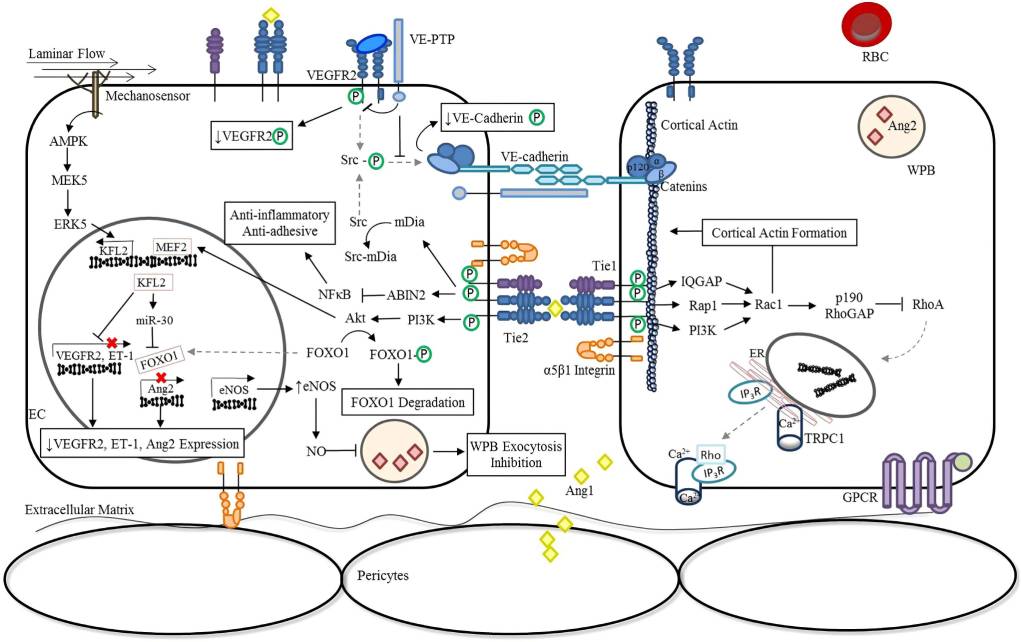Creative Biolabs is a world-leading service provider of application-specific antibody development. Here, we introduce our in vitro diagnostic (IVD) antibody development and immunoassay development services targeting the Angiopoietin 1 marker. Our state-of-the-art technologies ensure that our clients receive high-quality, stable, flexible, and cost-effective products and services.
Angiopoietin 1
Angiopoietin 1 (Ang1) is a type of angiopoietin, which is encoded by the gene ANGPT1. Angiopoietins are proteins that play crucial roles in vascular development and angiogenesis. All the angiopoietins bind to an endothelial cell-specific tyrosine-protein kinase receptor, with similar affinity. Ang1 is a secreted glycoprotein that activates the receptor through inducing its tyrosine phosphorylation. It binds and signals through the receptors such as tyrosine kinase Tie2, Tie1, and integrins. Ang1 plays an essential role in mediating reciprocal interactions between the surrounding matrix and mesenchyme, and endothelium. Ang1 also facilitates blood vessel maturation and stability and may also contributes to early development of the heart. Overall, Ang1 has powerful protective effects on blood vessels: preventing endothelial death, restraining plasma leakage, and inhibiting vascular inflammation.
 Fig. 1 Regulation of Ang/Tie pathway in vascular stability.1, 2
Fig. 1 Regulation of Ang/Tie pathway in vascular stability.1, 2
The Role of Angiopoietin 1 in Sepsis
Due to the role of angiopoietins in endothelial activation and the accessibility and ease with which their levels can be measured in patients, many researchers have explored the potential of angiopoietins as biomarkers of sepsis. Several studies have demonstrated that levels of Ang1 are related to the presence of sepsis, pulmonary vascular leak, ventilator-associated pneumonia, degree of inflammation, and discriminated uncomplicated malaria from cerebral malaria. What’s more, several in vitro and in vivo animal studies have indicated that Ang1 stabilizes the endothelium and protects animals from the deleterious effect caused by sepsis and endotoxemia on organ function. The Ang–Tie receptor–ligand signaling pathway has appeared to be a vital regulator of vascular function and circulating levels of Ang1 may provide helpful information about the status of endothelial dysfunction and organ damage during sepsis. Obviously, the effects of Ang1 in vivo show that manipulation of this protein could have diagnostic and therapeutic potential.
IVD Antibody Development Services for Ang1 Marker
Diagnosing and classifying the severity of sepsis has been regarded as a meaningful challenge because of the extremely variable and nonspecific properties of the signs and symptoms of sepsis. Antibodies that specifically recognize the biomarkers involved in the disease process has shown great potential in indicating the severity of sepsis. With advanced technology and professional scientists, Creative Biolabs is capable of offering a full range of IVD antibody development services against various markers for global customers. In addition, Creative Biolabs provides one-stop diagnostic immunoassay development services, including feasibility analysis, assay design, assay protocol establishment, validation, and production.
For more details and information, please feel free to contact us and get a quote.
References
- Leligdowicz, Aleksandra, et al. "Endothelial activation: the Ang/Tie axis in sepsis." Frontiers in immunology 9 (2018): 838.
- under Open Access license cc BY 4.0. without modification.
For Research Use Only.

